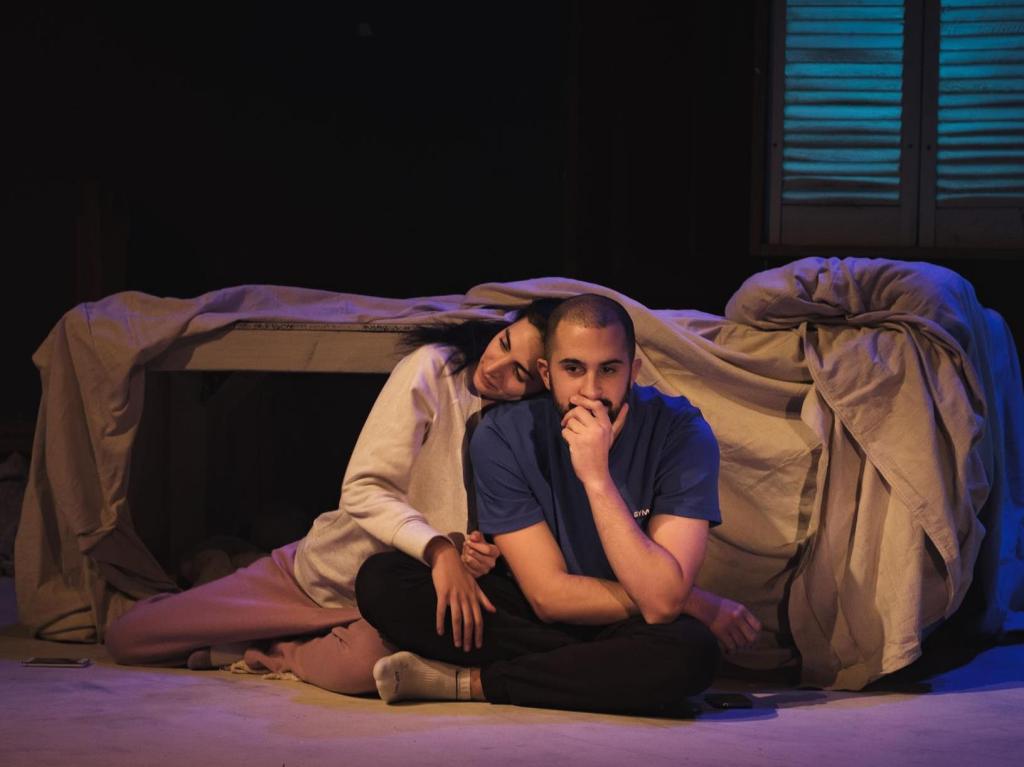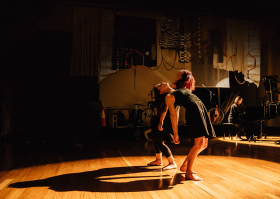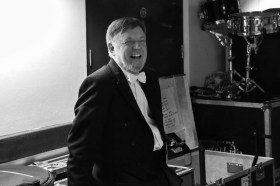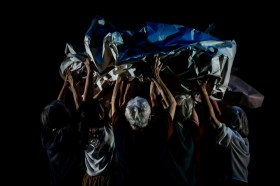Priscilla Doueihy & Abdulrahman Hammoud in THEM. Photo: Justyn Koh.
THEM is a bold embrace of everyday people in the moments before they are displaced by war. La Mama Courthouse presents its world premiere of this work by Palestinian-Australian-Canadian playwright Samah Sabawi following three years of creative development, brought to the stage by award-winning director Bagryana Popov.
THEM challenges the prevalent depictions of refugees as fleeing masses in overcrowded boats and horrific detention centres and resettles the gaze on normal people in their daily rituals and relationships. Living in a war zone in an unnamed Middle Eastern country, young parents Leila (Priscilla Doueihy) and Omar (Abdulrahman Hammoud) endure their fragile daily lives with the lingering question of whether they should flee. They cling to – but also doubt – their closest friends, Majid (Khisraw Jones-Shukoor) and Mohamad (Reece Vella) and Omar’s morally questionable whilst empathetic sister, Salma (Claudia Greenstone).
The narrative hones in on the moments when domestic peace is shattered by the war on one’s doorstep. As tension mounts over the 24 hours represented in the play, THEM conveys the complicated decisions involved in migration, relevant not only to the current situation in the Middle East but for all human life affected by war.
The cast’s generous performances capture the humanity of the situation. The chemistry between the actors and their familiarity with their roles gave the production an immersive warmth as they slipped between mundane and anguished instants. This owes to, in part, Sabawi’s script, developed in consultation with people living in conflict zones and those displaced by war – allowing the behaviour of the loveable whilst flawed characters within their hostile environment to carry elements of truth.
Yet, at times the researched script and eager performances also veer toward melodrama: the actors chat, shout, make love, and sincerely debate within seconds; there is hardly a pause in the entire production. Every emotion is communicated and framed with a distinct clarity not present in real life. The over-articulated dialogue becomes ungrounded, lacking the veracity of emotion that comes from apt pauses and body language.
Luckily, Lara Week’s set and costumes and Shane Grant’s lighting add some understated symbolism. Leila’s alternating pink and black outfits, and the piled rocks in the corner of the set added sophisticated qualities to the production, alongside Nahed Elrayes’s intermittent piano.
Leila and Omar’s kitchen table and bed served as both everyday objects and as protection during bomb raids, viscerally echoing the coexistence of their life’s docility and disruption. Compared to the script, the production was compellingly subtle in its most important moments: a flickering light and a turned table communicating destruction, and quivering water replacing a visualisation of the ubiquitous boat.
Sabawi was inspired to write THEM after witnessing protests against asylum seeker migration and sought to understand the ‘life, beauty, humour, love’ of ordinary Middle Eastern families before they left for the unknown. THEM, with its anonymity of country and endearing characters, does this perspective justice, subtracting the complicated politics from the refugee crisis and sharpening its human focus. But this focus on the domestic sphere and daily life also contributes to its greatest flaws.
Inside Leila and Omar’s nest, or Omar and his friends’ shisha hang-out, the characters’ bouncy chatter disproportionately conveys the normal in the abnormal. At times, the banter and flirtation slips too far into satire. The trauma unique to their situation is minimised and the context and tone is lost.
The play’s worst offence is packing the story, with its abundance of events and moods, into a time frame of 24 hours. Dark elements are dropped into light scenarios with no warning, resulting in some storylines, such as Salma’s child bride business or Leila’s secret, needing further development. An odd pace ensues as things become progressively sinister within one day when the situation would already have been desperate long before we met the characters.
THEM is a fast-paced rendition of the human soul caught within terrible circumstances with the familiar still at their fingertips. It is a welcome alternative to typical media representation of refugees, yet it is also sensationalised in its own way with its passionate dialogue and crammed narrative. Despite some erroneous steps, however, its sensitive portrayal of home highlights the importance of familiarity, safety and stability – and how war disrupts it – and beckons further empathy for the millions affected by war and mass human migration.
3.5 stars out of 5 ★★★☆
THEM
Written by Samah Sabawi
Directed by Bagryana Popov
Performed by Abdulrahman Hammoud, Priscilla Doueihy, Claudia Greenstone, Khisraw Jones-Shukoor, Reece Vella, and Nahed Elrayes
29 May-9 June 2019
La Mama Courthouse, Carlton VIC
Tickets $20-$30





